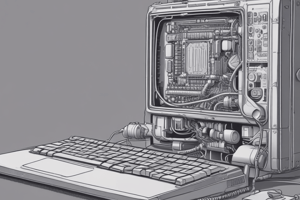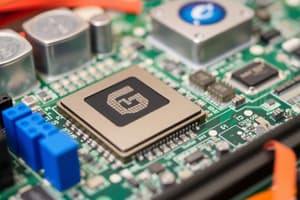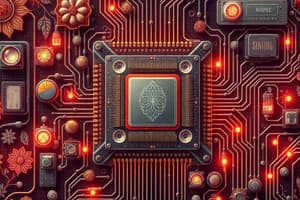Podcast
Questions and Answers
What is the primary function of the Central Processing Unit (CPU)?
What is the primary function of the Central Processing Unit (CPU)?
- To store data and programs
- To provide input/output functionality
- To execute instructions (correct)
- To manage hardware and provide an interface
What is the main difference between a desktop and a laptop computer?
What is the main difference between a desktop and a laptop computer?
- Processing power
- Portability (correct)
- Operating system
- Storage capacity
What is the primary function of firmware?
What is the primary function of firmware?
- To store data and programs
- To perform specific tasks
- To provide permanent software stored in read-only memory (correct)
- To manage hardware and provide an interface
Who is credited with designing the first mechanical computer?
Who is credited with designing the first mechanical computer?
What is the primary function of the storage drive?
What is the primary function of the storage drive?
What is the primary function of the operating system (OS)?
What is the primary function of the operating system (OS)?
Flashcards are hidden until you start studying
Study Notes
Definition
A computer is an electronic device that can store, process, and communicate information.
Components
- Hardware:
- Central Processing Unit (CPU): executes instructions
- Memory (RAM): temporary storage for data and programs
- Storage Drive: long-term storage for data and programs
- Input/Output Devices: keyboard, mouse, monitor, etc.
- Software:
- Operating System (OS): manages hardware and provides interface
- Application Software: programs that perform specific tasks
- Firmware: permanent software stored in read-only memory
Types of Computers
- Desktop: designed for stationary use, often for personal or professional use
- Laptop: portable, designed for mobile use
- Server: powerful computers that manage and store data for networks
- Mobile Devices: smartphones, tablets, and other handheld devices
- Embedded Systems: specialized computers integrated into devices, e.g., appliances, vehicles
Functions
- Processing: executes instructions and performs calculations
- Storage: stores data and programs
- Input/Output: receives and displays data
- Communication: connects with other devices and networks
Historical Development
- Charles Babbage (1822): designed the first mechanical computer, the Analytical Engine
- Electronic Computers (1940s): developed during World War II
- Personal Computers (1970s): affordable, accessible computers for individuals
- Modern Computers (1980s-present): rapid advancements in processing power, storage, and networking
Definition and Components
- A computer is an electronic device that can store, process, and communicate information.
- Hardware Components:
- Central Processing Unit (CPU) executes instructions
- Memory (RAM) provides temporary storage for data and programs
- Storage Drive offers long-term storage for data and programs
- Input/Output Devices include keyboard, mouse, monitor, and others
- Software Components:
- Operating System (OS) manages hardware and provides interface
- Application Software performs specific tasks
- Firmware is permanent software stored in read-only memory
Types of Computers
- Desktop Computers: designed for stationary use, often for personal or professional use
- Laptop Computers: portable, designed for mobile use
- Server Computers: powerful computers that manage and store data for networks
- Mobile Devices: smartphones, tablets, and other handheld devices
- Embedded Systems: specialized computers integrated into devices like appliances and vehicles
Functions of Computers
- Processing: executes instructions and performs calculations
- Storage: stores data and programs
- Input/Output: receives and displays data
- Communication: connects with other devices and networks
Historical Development of Computers
- 1822: Charles Babbage designs the first mechanical computer, the Analytical Engine
- 1940s: Electronic Computers are developed during World War II
- 1970s: Personal Computers become affordable and accessible to individuals
- 1980s-present: rapid advancements in processing power, storage, and networking lead to modern computers
Studying That Suits You
Use AI to generate personalized quizzes and flashcards to suit your learning preferences.



